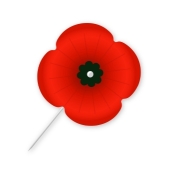 For Canadian teens, Remembrance Day is more about the events of 65, even 90 years ago, than it is about current military service. A 2005 study by University of Alberta researchers George Richardson and Laurence Abbott indicated that fewer than 10 per cent of teens think about military personnel serving in Afghanistan, or even those who served in Bosnia, when the red poppies are being passed out.“In 2005, Afghanistan wasn’t really on anyone’s radar screen, so that’s not too surprising,” said Richardson, a professor and associate dean of the Faculty of Education. “But there was also very little reference to Bosnia, or to our country’s lengthy history of peacekeeping. The focus was very much on World War I and World War II.”
For Canadian teens, Remembrance Day is more about the events of 65, even 90 years ago, than it is about current military service. A 2005 study by University of Alberta researchers George Richardson and Laurence Abbott indicated that fewer than 10 per cent of teens think about military personnel serving in Afghanistan, or even those who served in Bosnia, when the red poppies are being passed out.“In 2005, Afghanistan wasn’t really on anyone’s radar screen, so that’s not too surprising,” said Richardson, a professor and associate dean of the Faculty of Education. “But there was also very little reference to Bosnia, or to our country’s lengthy history of peacekeeping. The focus was very much on World War I and World War II.”
Richardson says this begs the question of how to bring Remembrance Day forward into events and sacrifices made more recently.
“For me, the real key is, if it’s going to be remembered as a sacrifice, how to make that a remembrance that moves forward with what’s happening more recently,” he said. “If Remembrance Day is solely tied to events in the past, kids will certainly see that as significant, but it leaves out the Canadian Forces of today.”
That significance may fade as veterans of those long-ago conflicts disappear.
“It’s difficult now, for a World War II vet, or even a Korean War vet, to get to schools, and it was the presence of those kinds of people that was really a humanizing factor for students,” Richardson said. “What’s happening now in schools, and I think this is a really important movement, is that soldiers who have done tours of duty in Afghanistan, and veterans of the Bosnian conflict, are visiting the schools. And you can see that the students are impacted by these people. The kids are dead silent when these folks are speaking.”
What encouraged Richardson was that the majority of teens felt Remembrance Day was an important celebration. Most said they felt it plays a significant role in helping develop a common sense of national identity.
“The notion that a nation’s military helps to preserve and protect our system of government, our values, and define us and our role in the world, is pretty clear,” he said.
That’s true today, just as it was when he was a teen, says Richardson.
“My dad was a World War II vet. He was wounded in the war. I grew up with his stories – some good and some bad – but it was only as I got older that I started to realize that he was a very young man when he went to war and he made a significant sacrifice for this country,” he said.
“My dad’s generation and that experience helped to form me and other people of my generation. What’s happening now will form the Canada the next generation knows.”
Richardson and Abbott plan to conduct a larger follow-up study in November of 2008. They will ask the same questions, with a broad cross-section of students and will check back on the earlier results to see what, if anything, has changed in how students view Remembrance Day.
Source: University of Alberta
